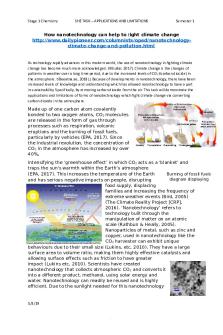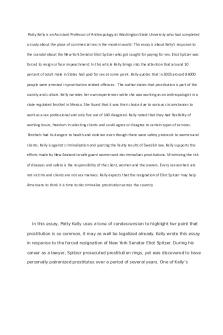Rhetorical Analysis: Climate Change PDF

| Title | Rhetorical Analysis: Climate Change |
|---|---|
| Author | Rut Pa |
| Course | Intro Comp |
| Institution | Texas Christian University |
| Pages | 7 |
| File Size | 90.7 KB |
| File Type | |
| Total Downloads | 60 |
| Total Views | 154 |
Summary
Rhetorical Analysis for Leonardo Dicaprio's Climate change speech. Ethos, Pathos, Logos, Kairos all discussed....
Description
1
Dr. Osbourne English 20803 13 February 2020 It is Not Too Late: The Fight Against Climate Change “We have a single mission: to protect and hand on the planet to the next generation” (World Economic Forum 2015). This quote by the President of France, Francois Hollande, serves as a constant reminder that the Earth belongs to our successors just as well and that now more than ever, we have to protect it. Recently it seems like many people - no matter the age, gender, culture, or social status - are advocates for the fight against climate change. Climate activists have taken initiative in the streets of their cities, within their communities, and by making more environmentally friendly individual choices. The United Nations Climate Summit has also become one of the most powerful platforms for climate activists around the world, giving a voice to conventional teenagers like Greta Thunberg and world-renowned celebrities like Leonardo DiCaprio. Although Thunberg and DiCaprio address the same issue at the same event, they both utilize different appeals and tones to persuade their audience. While DiCaprio supports his argument with a strong sense of ethos and logos, Thunberg makes a bold statement by appealing to her audience’s feelings.
DiCaprio begins his speech by building trust and credibility between himself and the audience with the statement, “I stand before you not as an expert but as a concerned citizen” (DiCaprio 2014). Such a statement coming from him was necessary since there was the probability that a great part of the audience could have been skeptical about his qualification
Panayotti 2 considering that he is an actor. He continues establishing credibility through ethos when he, later on, mentions that professionals belonging to the science, industry, government and military communities all agree that our climate is in crisis. This is followed by DiCaprio stating that Admiral Samuel Locklear, the Chief of the U.S. Navy’s Pacific Command said that climate change is the single greatest security threat. This is effective because he quotes a trustworthy, knowledgeable group of people who are also addressing climate change from the same point of view.
Although Leonardo DiCaprio previously mentions that he is not an expert in climate change, he uses his fame and career background to his favor by making a compelling analogy that he uses throughout the speech. DiCaprio states that “[As an actor] I play fictitious characters often solving fictitious problems. I believe mankind has looked at climate change in that same way: as if it were fiction” (DiCaprio 2014). With this analogy, DiCaprio appeals to pathos because it evokes a feeling of guilt in his audience - the delegates of the United Nations - for treating climate change as a fictitious problem for so many years. Leonardo uses various fallacies of emotional argument in his speech, such as the either/or argument when he says, “You can make history... or be vilified by it” (DiCaprio 2014). This statement makes the audience believe that they only have two options regarding the argument, and it provokes a feeling of fear and uncertainty in them. He also appeals to popularity at the beginning of the speech when he says that he was part of the 400,000 people who marched in New York and part of the billions of others around the world who want to solve the climate crisis. He makes himself part of the group
Panayotti 3 of people who are fighting climate change to appeal to their feelings and make them feel identified. DiCaprio also appeals to logos throughout his speech to support his claim. He uses hard evidence such as, “droughts are intensifying, oceans are acidifying...and ice sheets are melting at unprecedented rates” (DiCaprio 2014) to bring awareness to the issue at hand. He explicitly states that what he is saying is not rhetoric or hysteria, but plain facts. Finally, towards the end of his speech, DiCaprio makes various call-to-action statements. He proposes solutions such as putting a price tag on carbon emissions and eliminating government subsidies for oil, among others. The analogy about fictitious problems resurges at the end of the speech when he says, “Honored delegates, leaders of the world, I pretend for a living. But you do not,” creating a final emotional impact on the audience.
Thunberg’s speech has a significantly different approach than Leonardo’s, especially in regards to the tone. Greta, although only seventeen years young, speaks with an extremely passionate and bold tone. This contributes to the impact of the pathos she uses throughout the speech. By repeating the phrase “how dare you” numerous times, she creates a feeling of guilt in the audience for contributing and not doing enough to solve the climate crisis. She is a teenager scolding adults, telling them “You are not mature enough” and “You are failing us.” The repetition of the word “you,” which she uses almost two dozen times in her short speech, makes the feeling of guilt in the audience even more personal. She appeals to the audience’s emotions by saying, “I shouldn’t be up here. I should be back in school on the other side of the ocean” (Thunberg 2019), as she holds back her tears.
Panayotti 4 Through the use of short sentences, Thunberg shares with the audience various claims about the effects of climate change. She states that “People are suffering. People are dying. Ecosystems are collapsing. We are in the beginning of a mass extinction” (Thunberg 2019). She also utilizes percentages such as, “The popular idea of cutting our emissions in half in 10 years only gives us a 50% chance of staying below 1.5 degrees,” (Thunberg 2019) as hard evidence to support her claim. Although Greta effectively uses numbers to support her argument, she also utilizes jargon numerous times. From a skeptical point of view, someone in the audience might question if she really knows what she is saying when she talks about CO2, “feedback loops,” and “gigatons.” From another perspective, someone from the audience might not know what she is talking about but assumes that she does know, therefore they agree with her conclusion. Someone from this perspective might give her credit for her apparent knowledge in the subject. Regardless, Thunberg maintains her trustworthiness because of the self-confidence she demonstrates as she states the facts.
Besides showing complete confidence in her knowledge on the topic, Thunberg appeals to ethos in various other ways. Greta, speaking on behalf of the future generations, gains credibility for the mere fact that she belongs to this group of young adults who will be suffering the consequences of climate change. She also appeals to ethos by demonstrating that she has unselfish and clear motives. Her purpose is not to make her audience feel bad, but to stress the fact that not much is being done to tackle climate change, and that the future generations are in imminent danger.
Panayotti 5 Although they utilized different devices and tones, both Thunberg and DiCaprio successfully informed and persuaded their audience about the fight against climate change. Greta’s courage to deliver such a passionate speech at a young age positively impacted her credibility, and at the same time appealed to the feelings of her audience. Leonardo, on the other hand, appealed to ethos by utilizing his reputation as a celebrity to his advance, and through the use of impactful facts and analogies, he successfully persuaded his audience.
Panayotti 6 Author’s Note
In this unit, I learned about how a writer or speaker can back up his argument by appealing to rhetorical devices such as ethos, pathos, locos, and kairos. I also learned about the rhetorical situation, which refers to the relationship between the writer, text, and audience. This essay is a reflection of my learning because I was able to construct an analysis about how each speaker utilized all of the rhetorical appeals in various and different ways. The writing process was not hard for me because of the worksheets (supporting materials) we did in and out of class. They helped structure my ideas and make me dig deeper into not only what appeal was being used but also why. I learned that even though I usually have a hard time writing papers, this rhetorical analysis was enjoyable for me to write. I sat down with the printed transcripts of each speech and highlighted all the devices that I could find. After writing my essay, I put it on Grammarly to go over small mistakes. Then I emailed it to the TCU Writing Center for tips on flow of ideas and also grammar errors. The peer review helped me a lot too because I did not know my essay was lacking a lot of elements. Some of the big changes were that I had not cited my sources, my thesis was incomplete, I did not have a conclusion, and I did not have an attention grabber at the beginning of my essay.
Panayotti 7 Works Cited “Leonardo Delivers Landmark Speech at the United Nations Climate Summit.” The Leonardo DiCaprio Foundation, 27 Apr. 2017, www.leonardodicaprio.org/leonardo-delivers-landmark-speech-at-the-united-nations-climatesummit/.
Santiago, José, and World Economic Forum. “15 Quotes on Climate Change by World Leaders.” World Economic Forum, 27 Nov. 2015, www.weforum.org/agenda/2015/11/15-quotes-on-climate-change-by-world-leaders/.
Staff, NPR. “Transcript: Greta Thunberg's Speech At The U.N. Climate Action Summit.” NPR, National Public Radio, 23 Sept. 2019, www.npr.org/2019/09/23/763452863/transcript-greta-thunbergs-speech-at-the-u-n-climate-ac tion-summit....
Similar Free PDFs

Climate Change
- 3 Pages

GCED Climate Change DONE
- 14 Pages

Climate Change - Module 10
- 15 Pages

Climate change webquest 1
- 12 Pages

Reflection on Climate Change
- 2 Pages

Climate change worksheet 1
- 3 Pages

5. Global Climate Change
- 14 Pages

Cornell Climate Change response
- 1 Pages

Climate change nanotech she task
- 4 Pages

Rhetorical Analysis
- 5 Pages

Rhetorical analysis
- 2 Pages

How to kahoot - Climate Change
- 1 Pages
Popular Institutions
- Tinajero National High School - Annex
- Politeknik Caltex Riau
- Yokohama City University
- SGT University
- University of Al-Qadisiyah
- Divine Word College of Vigan
- Techniek College Rotterdam
- Universidade de Santiago
- Universiti Teknologi MARA Cawangan Johor Kampus Pasir Gudang
- Poltekkes Kemenkes Yogyakarta
- Baguio City National High School
- Colegio san marcos
- preparatoria uno
- Centro de Bachillerato Tecnológico Industrial y de Servicios No. 107
- Dalian Maritime University
- Quang Trung Secondary School
- Colegio Tecnológico en Informática
- Corporación Regional de Educación Superior
- Grupo CEDVA
- Dar Al Uloom University
- Centro de Estudios Preuniversitarios de la Universidad Nacional de Ingeniería
- 上智大学
- Aakash International School, Nuna Majara
- San Felipe Neri Catholic School
- Kang Chiao International School - New Taipei City
- Misamis Occidental National High School
- Institución Educativa Escuela Normal Juan Ladrilleros
- Kolehiyo ng Pantukan
- Batanes State College
- Instituto Continental
- Sekolah Menengah Kejuruan Kesehatan Kaltara (Tarakan)
- Colegio de La Inmaculada Concepcion - Cebu



